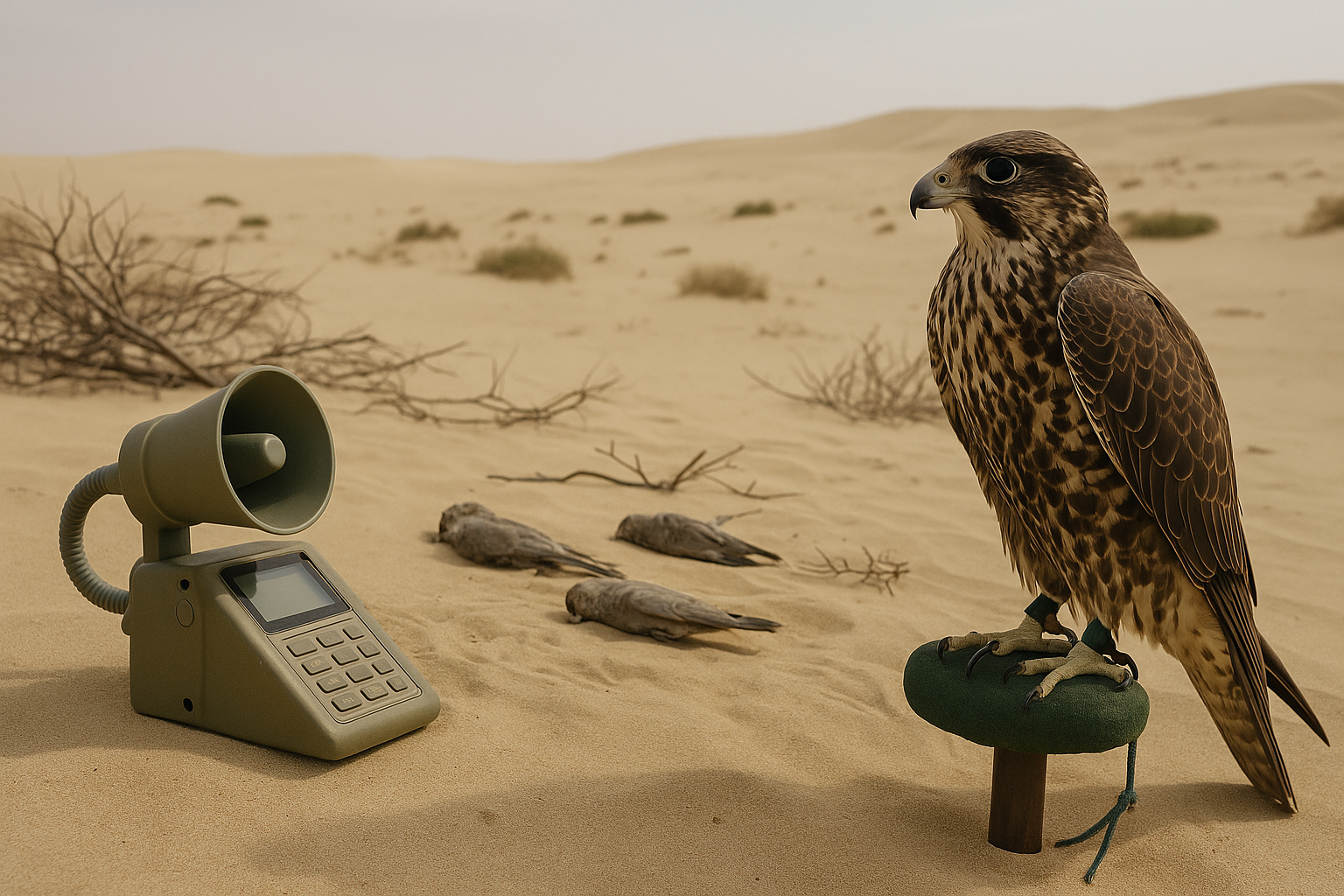Home / Blog / Preserving Qatar’s Natural Heritage: Ministry of Environment & Climate Change Takes a Stand Against Illegal Hunting and Wildlife Trade

Qatar’s diverse ecosystems — from its sand dunes to nature reserves — are under increasing pressure from poaching, illegal wildlife trade, and prohibited hunting practices. But thanks to determined action by the Ministry of Environment and Climate Change (MECC), the tide is turning in favour of conservation. Recent high-impact operations—including device seizures, offender arrests, and crackdowns on wildlife trade—show that Qatar is committed to protecting its precious biodiversity.
🎯 1. Immediate action against illegal hunting (June 15, 2025)
On 15 June 2025, MECC’s Wildlife Protection team uncovered and neutralized a coordinated attempted illegal hunt in Qatar’s desert environment. Authorities swiftly responded: wildlife wards seized prohibited equipment, arrested offenders, and referred them to judicial authorities.
This rapid intervention sends a clear warning: Qatar will not tolerate encroachments on protected species or environments. It aligns with MECC’s broader mission to support sustainability under Qatar National Vision 2030.
2. Device confiscation at Al Reem Reserve (March 17, 2025)
In a strategic campaign carried out on 17 March 2025, MECC teams carried out surprise inspections at the sensitive Al Reem Reserve, uncovering twelve electronic bird‑calling devices, locally known as Sawayat. These devices are typically used to lure wild birds into traps—undermining nesting cycles and disrupting ecological balance.
The devices and the individuals responsible were immediately confiscated and referred for legal proceedings.
This enforcement illustrates MECC’s proactive use of both advanced technology and surprise inspections in protecting migratory bird populations, highlighting their strategic significance to local and international biodiversity frameworks.
3. Protecting biodiversity: female hunters arrested (March 2025)
Also during March, MECC made headlines with the arrest of 12 female hunters caught flagrantly breaching environmental protections in Al Reem Reserve.
This bold operation not only curbed potential wildlife depletion, but was also a public example reflecting Qatar’s impartial enforcement of environmental law—regardless of gender, social standing, or location.
4. Cracking down on illegal wildlife trade (June 5, 2025)
On 5 June 2025, another significant MECC operation targeted shops and stalls engaged in illicit trade of wildlife species and exotic plants. Inspection teams combed through retailers, verifying permits and ensuring conformance with both domestic legislation and CITES (Convention on International Trade in Endangered Species).
This regular sweep helps close loopholes in the supply chain—particularly in ornamental plants and exotic species—reinforcing regulatory compliance and preserving global biodiversity.
5. CITES awareness workshop: building capacity (March 2025)
Beyond enforcement, MECC is actively investing in capacity building. Earlier in 2025, they hosted a national workshop on CITES, attended by stakeholders, veterinarians, environmental researchers, and enforcement officers. It included sessions led by experts like Dr. Abdulla bin Abdulaziz al‑Turki.
Key takeaways included:
- Updates on CITES appendices and new regulations
- Best practices for permitting and inspections
- Methods for tracking illegal wildlife trade and cross-border trafficking
Such training empowers local authorities, enhancing their ability to act decisively and in line with best international protocols.
6. Historical precedence: end of hunting season (February 2024)
Looking back, MECC’s long‑standing commitment is evident in its announcement of the hunting season’s closure for birds and wild animals on 8 February 2024.
Timely closures help prevent unsustainable hunting during critical breeding seasons—balancing tradition and protection—and maintaining healthy wildlife stocks.
Why These Efforts Matter
🌿 1. Conservation of biodiversity
Qatar is a crossroads for migratory bird species, some endangered. Actions like confiscating illegal devices and closing hunting season help maintain biodiversity.
✊ 2. Upholding environmental law
Visible enforcement—regardless of who breaks the law—builds public trust and shows that no one is above environmental legislation.
🏛️ 3. International obligations
Qatar’s active participation in CITES and other treaties enhances its global reputation and ensures compliance with international conservation standards.
🛡️ 4. Local awareness and capacity building
Workshops bring together key stakeholders—fostering a culture of environmental protection and ensuring coordination across actors.
Strengthening Qatar’s Conservation Posture: Next Steps
- Expand Reserve Surveillance
The MECC could increase patrols and install monitoring equipment in sensitive ecosystems like Al Reem and the Inland Sea. - Public Outreach Campaign
Image campaigns across schools, community centres, and online platforms (e.g. MECC website) would raise awareness about hunting bans, penalties, and the value of biodiversity. - Permit Digitization
Moving to an online permit system for wildlife trade, with checks against agencies like INTERPOL’s wildlife trafficking database, would improve transparency and reduce corruption risk. - Seasonal Enforcement Intensification
Bolster inspections and patrols during migration windows (March–May, September–November) when demand for bird calls and traps surges. - Collaboration with NGOs
Partnering with local and global NGOs (e.g., BirdLife International or WWF) can improve data collection, rescue operations, and community education.
Final Thoughts
Between confiscating 12 electronic bird‑calling devices, arresting hunters, closing hunting seasons, and hosting a national workshop on CITES compliance, Qatar’s Ministry of Environment and Climate Change is setting clear milestones in its conservation narrative.
These multi‑layered actions—legal, technological, and educational—are not only about preserving species, but also about transforming public and institutional understanding of Qatar’s natural heritage.
[Sassy_Social_Share]